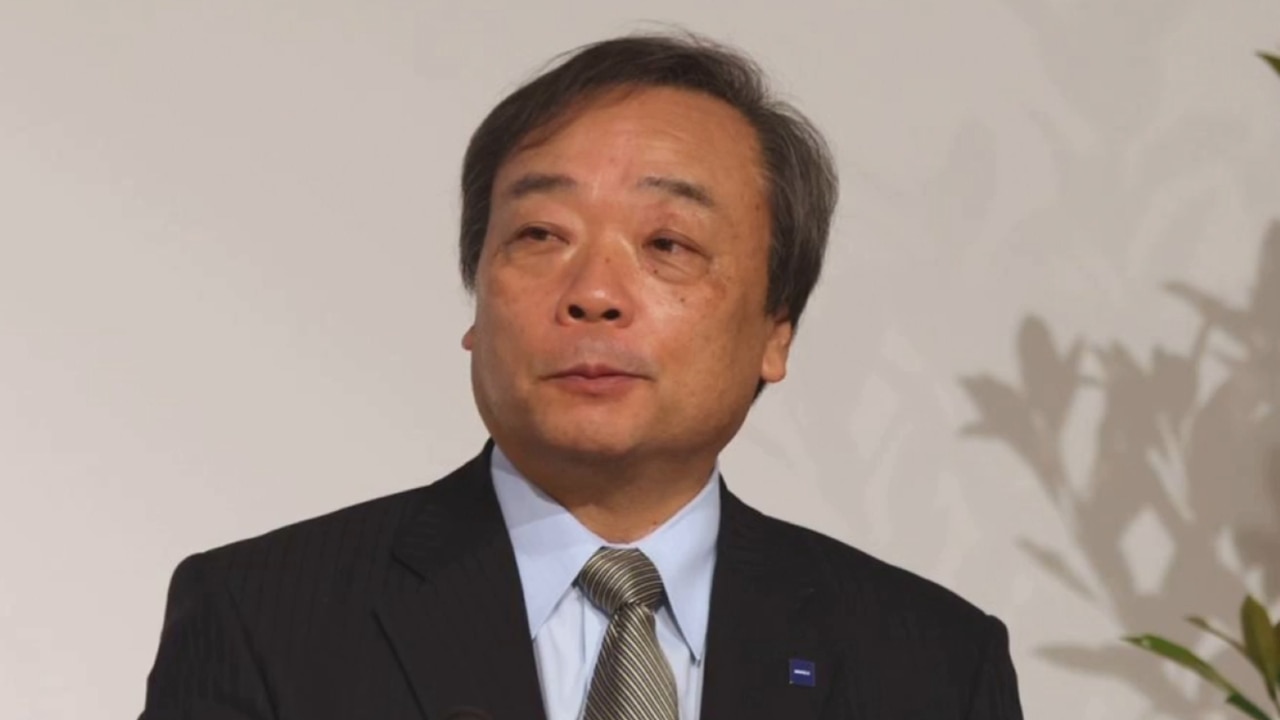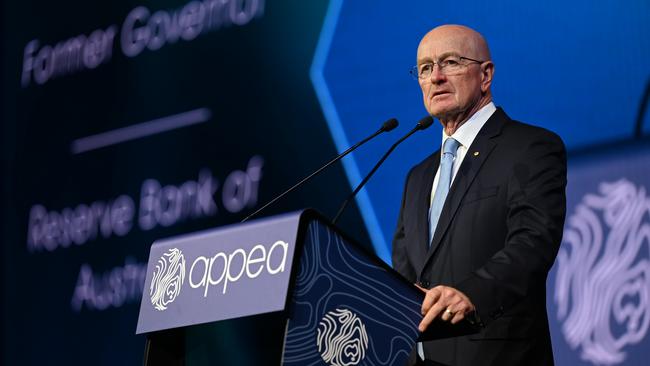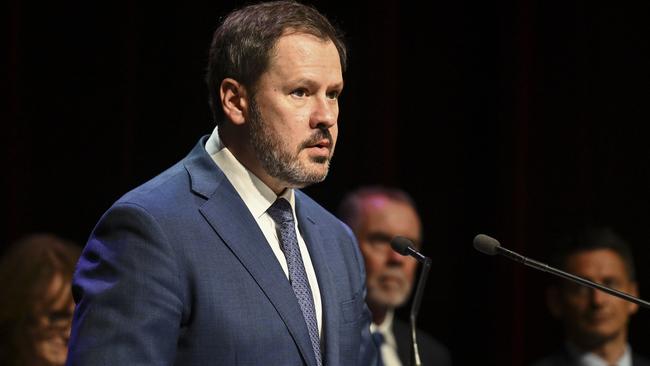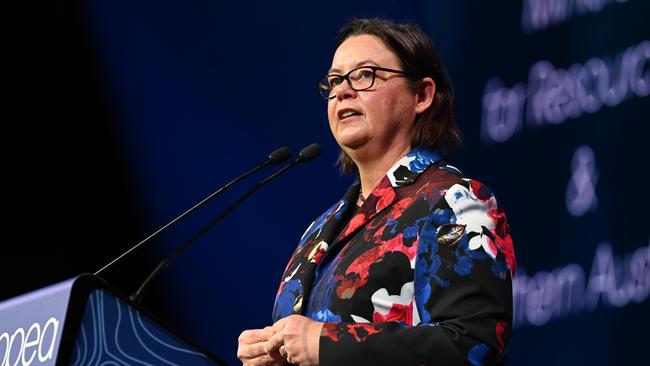Get used to intervention, Former Reserve Bank governor Glenn Stevens tells oil and gas industry
Former RBA governor Glenn Stevens has told the oil and gas sector that government intervention is something it must come to terms with.

Former Reserve Bank governor Glenn Stevens has told the oil and gas sector to get used to government intervention in the domestic market, despite the ACCC flagging a potential “roll back” of controversial price controls imposed on wholesale gas producers.
Speaking at an Australian Petroleum Production and Exploration Association (APPEA) oil and gas conference in Adelaide on Tuesday, Mr Stevens said global economies were still grappling with the economic fallout from Covid-19, and that would inevitably lead to continued intervention in industries most affected by the economic shock of the pandemic and other challenges such as Russia’s war in Ukraine.
He said the Covid-19 period had “legitimised and expanded” state intervention in the economy, when it was highly vulnerable to the health effects of the pandemic.
Warning of more economic turbulence in the months ahead, Mr Stevens drew comparisons with the financial services sector, in which he expected more regulation following a string of high-profile banking collapses in the US and Europe.

“The broader legacy of the Covid period, I think, might extend beyond the short term,” he said.
“The reason I say that is that the pandemic unavoidably legitimised and expanded state intervention in the economy that perhaps would not have been accepted in an earlier era.
“Certainly one result I suspect of the financial turmoil that we’ve seen recently is likely to be more financial regulation globally, perhaps including smaller banks and non-bank entities who up to now have been outside the regulatory net.
“But an expanding government footprint isn’t just in finance. I don’t need to tell this audience this – direct intervention in energy pricing, for example, seems to be more pervasive than it was only a short time ago.
“More generally I would say, as an economist, that the role of market arrangements in which prices reflect demand and supply, and prices serve to allocate productive resources – that world is a little bit in retreat.”
The oil and gas industry has been responding to a string of government interventions in the domestic gas market, including a temporary cap on wholesale gas prices and a mandatory code of conduct that will govern longer term price setting.
APPEA and major oil and gas companies such as Santos and Woodside, have previously warned that the measures would deter additional investment in new gas projects needed to avoid looming shortages on the nation’s east coast.
However on Tuesday, ACCC commissioner Anna Brakey flagged a potential roll back of the interventions, including the $12 per gigajoule price cap, if adequate competition returns to the market before the current two-year time frame concluded.
Speaking at the APPEA conference, Ms Brakey said that while a review of the measures was currently aligned to the price cap’s two-year time frame, which ends in July 2025, there was the capacity to bring that forward should the competitive environment improve.
She said working out how to “roll back” interventions was a common topic of interest for regulators globally.

“After the two years there is a review, which can happen earlier if the market changes and the minister brings it forward,” Ms Brakey said.
“That review is a real opportunity to sit back and say ‘what do we need to do’.
“It’s in everybody's interest for the market to return to … competitive levels so we can get out of this intervention, and that’s the design of the intervention.
“If it’s not working, there’s the chance for the government to kind of figure out what would better work.
“But if the market is … competitive, and I think that is what we’re all gunning for, then that intervention can roll back.’’
The $12 per gigajoule price cap on natural gas, which was first introduced as a one year emergency measure in December last year, was recently extended out to July 2025 as part of a suite of refined gas market interventions announced by the federal government earlier this year, which also includes a proposed mandatory code of conduct for the east coast gas market.
Submissions on that proposed code of conduct closed on May 12.

Industry Minister Ed Husic will use a speech to the Energy Users’ Association on Wednesday to defend the price cap and code of conduct, arguing it will enable east coast gas users to contract for gas at “reasonable prices and on reasonable terms”.
“To ensure the code’s final design is right for users, we will work closely with industry peaks – like the EUAA and with individual gas users like yourselves,” he will say.
“That is vital to ensuring that the solution that we develop is fit for purpose, delivering fair prices and stable contracts that help to underpin the expansion of manufacturing in Australia.”
However, Mr Stevens said that while some market intervention was “unavoidable” given the political environment, he warned of the potential unintended consequences.
“I’m old enough to remember a world in which you came to feel that government ownership and strong intervention in the financial system – you came to feel that was a world that wasn’t very efficient for resource allocation,” he said.
“I think the task for decision makers in this space into the future is to design the frameworks, do the interventions that really are needed, but allow the price mechanism and the market mechanism to do its job within the framework.

“Allowing for the price mechanism, productive decisions and so on from the business world – that’s where the productivity comes from.”
The ACCC forecasts a shortfall of gas on Australia’s east coast in 2027, and along with the Australian Energy Market Operator, it has warned Australia’s future domestic gas needs would not be met through existing sources of supply.
The International Energy Agency has also acknowledged that even in its most ambitious transition scenarios, more new investment in gas resources would be needed.
Challenged on whether gas market interventions simply “kicked the can down the road” by deterring investment and therefore baking in high prices for the longer term, Ms Brakey said the ACCC hoped new investment would boost east coast gas supply.
Meanwhile the federal government hopes a new national gas strategy, announced in last week’s budget, will support the critical role gas will play in the energy transition.
Federal Resources Minister Madeleine King said the gas strategy would “balance energy security with affordability and investment certainty”.
“The strategy will support Australia’s energy system to become cleaner, cheaper and more reliable while maintaining our international reputation as a trusted energy supplier to the region,” she said.





To join the conversation, please log in. Don't have an account? Register
Join the conversation, you are commenting as Logout